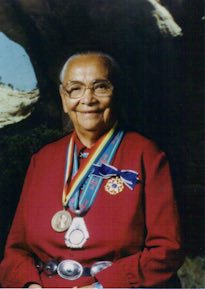Annie Dodge Wauneka, tribal leader of the Navajo Nation and public health activist, worked tirelessly to improve the health and welfare of the Navajo Tribe and reduce the incidence of tuberculosis nationwide.
Born in 1910 in a traditional Navajo hogan, Wauneka was raised by her father, one of the wealthiest men of the Navajo Tribe. While taught Navajo history and culture, Wauneka also gained a general education. When she was eight, while attending a government-run school on the reservation, a tragic event occurred that helped shape the rest of her life. An influenza epidemic struck. Thousands of Navajos, including many of Wauneka’s classmates, died. Wauneka escaped with only a mild case that left her resistant to the disease. Thus she was able to care for those who were too ill to feed themselves. After graduation and her marriage to George Wauneka, Annie continued to travel with her father, observing the poverty and disease that plagued most of the Navajo. She studied public health and then, realizing that the best way to change the standards of health and sanitation among tribal members was from within, Wauneka gained election in 1951 to the Tribal Council, the second woman ever so elected.
During her three terms in office, Wauneka led the fight against tuberculosis. She wrote a dictionary to translate English words into Navajo for modern medical techniques, such as vaccination. Her weekly radio broadcasts, in the Navajo language, explained how modern medicine could help improve health among the Navajo. She also worked on other health problems including better care for pregnant women and new babies, regular eye and ear examinations, and alcoholism. She continued working in her community on health issues until her death in 1997. She helped improve housing and sanitation conditions and convinced her tribe to adopt many modern medical practices and avail themselves of hospital care, when needed. She also served on the advisory boards of the U.S. Surgeon General and the U.S. Public Health Service.
In 1963, Wauneka became the first Native American to receive the Presidential Medal of Freedom. Ladies’ Home Journal selected her a Woman of the Year in 1976. In 1984, the Navajo Council designated her “The Legendary Mother of the Navajo Nation.” All recognize that through her efforts in education and health, the lives of every Navajo, as well as the nation at large, have been improved.

